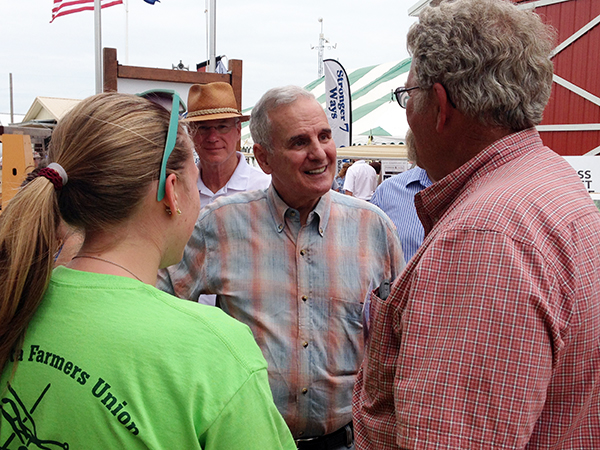8/7/2014 10:14:43 AM

Today Governor Dayton traveled to Redwood, MN to speak in a forum at Minnesota's annual Farmfest. To recognize the contributions to our state and their community, Governor Dayton has proclaimed August 7, 2014 /governor/assets/Family%20Farm%20Recognition%20Day_tcm1055-100766.pdfFarm Family Recognition Day in honor of the 66,000 family-owned and operated farms across the state.
Family farms make up the backbone of Minnesota's economy. From raising livestock to maintaining crops, Minnesota relies on farm family communities to build and sustain Minnesota agriculture and economy. Farm Families of Minnesota generate over 3 billion dollars in exports and are in strong support of renewable energy efforts.
"Minnesota is the fifth largest producer of agricultural products in the nation," said Department of Agriculture Commissioner Dave Frederickson. "Agriculture generates an estimated $90 billion in economic activity in this state."
Farmfest is an annual agricultural fair that celebrates these accomplishments. With a packed schedule, this gathering offers livestock handling, panel discussions, crafts, seminars and entertainment. Each year the University of Minnesota presents the Farm Family of the Year Award which recognizes 70 Minnesota farm families who have contributed to our state's' agricultural economy and their communities.
It is important to acknowledge Minnesota Farm families not only for their fundamental role in Minnesota agricultural economy, but also as community members that make Minnesota a better place. Governor Mark Dayton fully supports and promotes local farming here in Minnesota. Since taking office in 2011, Governor Dayton and the Department of Agriculture have implemented the following initiatives:
Agriculture Growth, Research and Innovation Fund - The initiative helps Minnesota farmers and business by providing grants, loans, and other forms of financial assistance. This support allows producers to expand, resulting in more jobs, and greater profits in the areas of livestock investment, value added business and market development, and renewable energy development.
Agricultural Property Tax Relief - Growing farmland values have caused farm property taxes to increase in recent years. In 2014, Governor Dayton and the Legislature provided $16.9 million in direct property tax relief to Minnesota farmers.
Biofuel Development - The biofuel mandate that went into effect on July 1 puts Minnesota at the forefront of promoting cleaner, home-grown fuels, while also taking another important step toward reducing greenhouse gas emissions. Not only is switching to biodiesel a benefit for our environment, it is good for our economy. Biofuels production contributes an estimated $6 billion annually to the Minnesota economy.
Protecting Water Resources - Minnesota farmers also are leading the way in a first of its kind voluntary program designed to accelerate adoption of on-farm conservation practices that protect Minnesota's lakes and rivers. Producers who implement and maintain farm management practices approved under the Minnesota Agricultural Water Quality Certification Program are certified and in turn assured that their operation meets the state's water quality goals and standards for a period of ten years.
Farmer-Lender Mediation Extension - Governor Dayton and the Legislature extended the Farmer-Lender Mediation program in 2013. The act ensures lenders work with farmers to find payment solutions rather than resort to repossession and foreclosure. This initiative is essential supporting hardworking Minnesota farmers.
Cultivating Pollinator Habitats - Minnesota's agricultural industry depends on bees, butterflies, and other pollinators. These species play a critical role in the life cycles of three-fourths of all plants. During the past decade, Minnesota's pollinator populations have steeply declined. To ensure the vitality of Minnesota's agricultural industry, Governor Dayton and the Legislature invested initiatives to protect pollinators and restore their habitats.
Agriculture
Greater Minnesota
Jobs
Economy